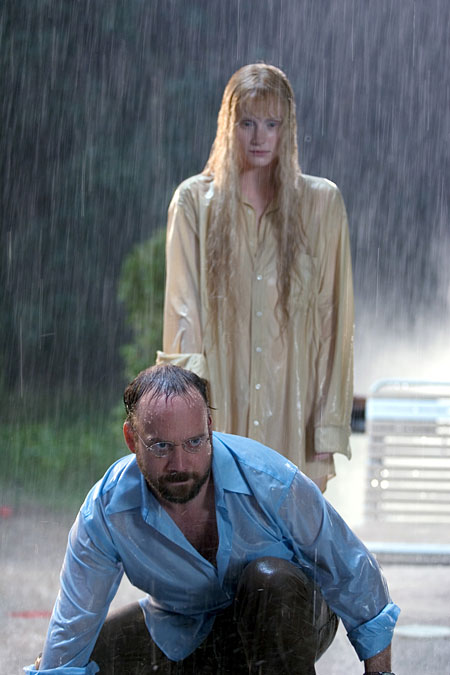
Chesterton once famously said, “Not facts first, truth first.”
This is the essence of fairy stories. Based on fact, imbued with truth, they are a child’s bedtime Sunday school. Whether or not you think unicorns or griffins ever existed, the lessons we learn from true fairy stories are as real as can be. Because a real fairy story has to have definite morals, clear representation of good and evil, and rules that must be followed, I believe Guillermo del Torro’s Pan’s Labyrinth was a failure. Its antithesis is M. Night Shyamalan’s perfect fairy story, Lady in the Water. The chief difference to me is the beautiful innocence of Lady in the Water as compared to the total lack of it in Pan’s Labyrinth. Story flees from those who would harm her; Ofelia, trying to escape from her father, doesn’t just put enough sleeping drug in his drink to knock him out. She puts in what should be enough to kill a cart horse. The good guys in Lady in the Water are genuinely likable. They unite to save Story, putting aside personal convenience and differences. Meanwhile, back in Pan’s Labyrinth, del Torro presents us with a band of Communists hiding in the woods plus Ofelia (unless you count Ofelia’s mom, who is essentially a non character). These guys heroically euthanize their comrades and don’t kill their enemies…they just torture and mutilate them. Lady in the Water is all about following the rules; the climax of trying to get Story home involves the characters discovering their roles in her survival and fulfilling them. Ofelia breaks the rules in the Guy-With-Eyes-On-His-Hands house, but escapes. The consequences of this misdemeanor turn out to be no consequences at all, since Pan doesn’t desert her for good, like she was told. It was more like five minutes. And of course, one of the worst things about Pan’s Labyrinth for me was that the whole fantasy was in Ofelia’s head. None of the magical kingdom was real. She sees it all one last time while lies dying…then she’s back on the cold hard ground and breathes her last. In Lady and the Water everything was real. There was no death of the child; rather, Cleveland must become like a child to hear the rest of the story, and the veteran says at the end “I wanted to be a child again.” Then there’s the overall message. The only thing I could really pick up from Pan’s Labyrinth was that “life is pain.” Funny quote when it’s made by a guy talking to the love of his life while dressed up as a pirate; there, the irony is that he’s about to make all her pain go away. In Pan’s Labyrinth, we have one dead mother, one dead little girl, one fake world where everything’s interesting and magical, one real world where the people you care about die, one evil father who is nonetheless shot dead in cold blood, and one baby in possession of a supposedly good maid who has a suspiciously sadistic side. On the other hand, with Lady in the Water, life has meaning. “Every living being has a purpose,” Story tells Cleveland. The man who was a doctor wasn’t supposed to be a building superintendent. This is made clear all through the movie, as he is late to fix the plumbing, can’t fix the sprinklers, keeps getting calls from a lady complaining of the smell upstairs, and fixes the light bulb above Vick’s desk weeks after being asked to do it. We see rusty handrails, grass overgrowing the courtyard, and other signs of neglect and decay. Only when he accepts his role as Healer is Cleveland able to ask forgiveness from the family he wasn’t there to protect, and go back to doing what he was born to do. He thanks Story for saving his life: she saved him because he saved her. I feel like Lady in the Water wasn’t received well due in part at least to the fact that our world’s nature is steadily growing more jaded and cynical. If you’ve outgrown fairy stories, then of course Lady in the Water seems a bit much, what with the strange names, the improbable creatures, and unworldly plot. However, if you’ve outgrown fairy stories, you’ve mistaken what is childlike for what is childish, which is exactly the mistake so many make when viewing Lady in the Water.
“Verily I say unto you, Except ye be converted, and become as little children, ye shall not enter into the kingdom of heaven.”


4 comments:
read the golden key by macdonald and it's afterword by wh auden for a brief example and explanation of the fairy tale. good stuff.
jrrt's essay on fairy stories is also good stuff.
also read macdonald's The Light Princess. Great example of a fairy tale that's less obscure than The Golden Key.
Well, I've read both The Light Princess and The Golden Key. And they're both GREAT.
I love MacDonald.
Post a Comment